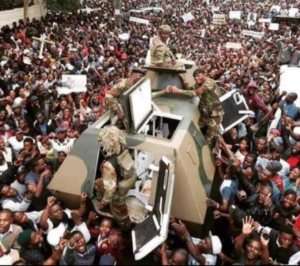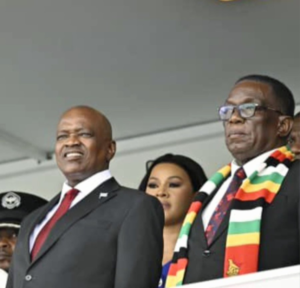SOUTH AFRICAN PRESIDENT’S HUG AND HOME AFFAIRS’ DEPORTATION PLAN: A CONTRADICTION IN POLICY

In a perplexing display of contrasting actions, South African President Cyril Ramaphosa embraced Zimbabwean President Emmerson Mnangagwa at the recent inauguration ceremony in Harare, even as the Southern African Development Community (SADC) condemned Zimbabwe’s controversial election. Simultaneously, South Africa’s Home Affairs minister, Aaron Motsoaledi, was pushing forward with a plan to deport Zimbabwean migrants. These conflicting moves highlight the complexity of South Africa’s approach to its northern neighbor and raise questions about the coherence of its foreign and domestic policies.
Ramaphosa’s Gesture: Diplomacy or Ambiguity?
The warm embrace between President Ramaphosa and President Mnangagwa at the inauguration ceremony sent mixed signals to the international community. While many expected Ramaphosa to take a strong stance against the widely criticized election in Zimbabwe, his hug instead seemed to imply a degree of acceptance. This move came just days after SADC had condemned Zimbabwe’s election as a “sham,” casting doubts on its legitimacy.
Some argue that Ramaphosa’s embrace could be seen as an attempt at diplomacy and engagement. South Africa has long played a pivotal role in mediating conflicts within the region, and maintaining communication channels with Zimbabwe is considered vital for stability. However, others view this gesture as an implicit endorsement of Mnangagwa’s government, which has faced accusations of human rights abuses and electoral misconduct.
Home Affairs’ Deportation Plan: A Harsh Reality
While Ramaphosa’s diplomatic embrace raised eyebrows, back in South Africa, the country’s Home Affairs minister, Aaron Motsoaledi, was pursuing a tough stance on Zimbabwean migrants. Motsoaledi’s plan to deport Zimbabweans, especially in the context of the controversial election, appears contradictory and raises concerns about the coherence of South Africa’s immigration policy.
Motsoaledi’s rationale for deportation revolves around the need to address immigration issues and uphold the rule of law. He argues that South Africa cannot continue to accommodate undocumented migrants, citing concerns about overcrowded cities and strained resources. However, critics argue that this move seems inconsiderate, given the turmoil and instability in Zimbabwe, which often drives people to seek refuge in neighbouring countries like South Africa.
Navigating South Africa’s Complex Position
South Africa finds itself in a precarious position when it comes to its relationship with Zimbabwe. On one hand, the country is committed to upholding democratic values and human rights in the region, as evidenced by its involvement in SADC’s condemnation of the Zimbabwean election. On the other hand, it faces domestic pressures to manage immigration and address the socioeconomic challenges posed by a large population of undocumented migrants.
To navigate this complex situation, South Africa must strike a balance between diplomatic engagement and domestic policy enforcement. This requires clear communication and a well-defined stance on its expectations from Zimbabwe regarding democracy and human rights. It also necessitates a comprehensive immigration policy that considers the realities faced by migrants while upholding the rule of law.
A Call for Coherence
In the midst of these contradictory actions, there is a growing call for coherence in South Africa’s foreign and domestic policies. The country must define a clear and consistent approach to its relationship with Zimbabwe that aligns with its commitment to democratic values and human rights. Simultaneously, it should develop a compassionate and practical strategy for dealing with undocumented migrants, acknowledging the complex reasons that drive people to seek refuge in South Africa.
In conclusion, the recent events involving President Ramaphosa’s embrace of President Mnangagwa and Home Affairs’ deportation plan for Zimbabwean migrants underscore the intricate web of challenges facing South Africa. Striking the right balance between diplomacy and domestic policy enforcement is essential to uphold the nation’s values while addressing its concerns. South Africa must work towards a more coherent and sustainable approach to both foreign and domestic affairs to maintain its role as a regional leader and a beacon of democratic values in Africa.



